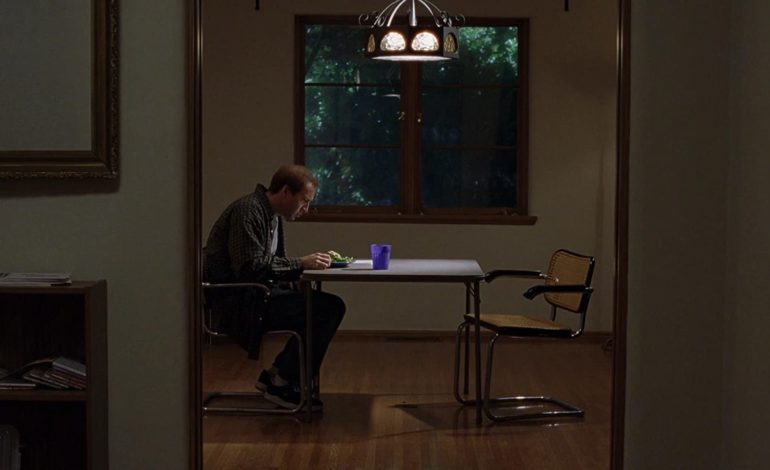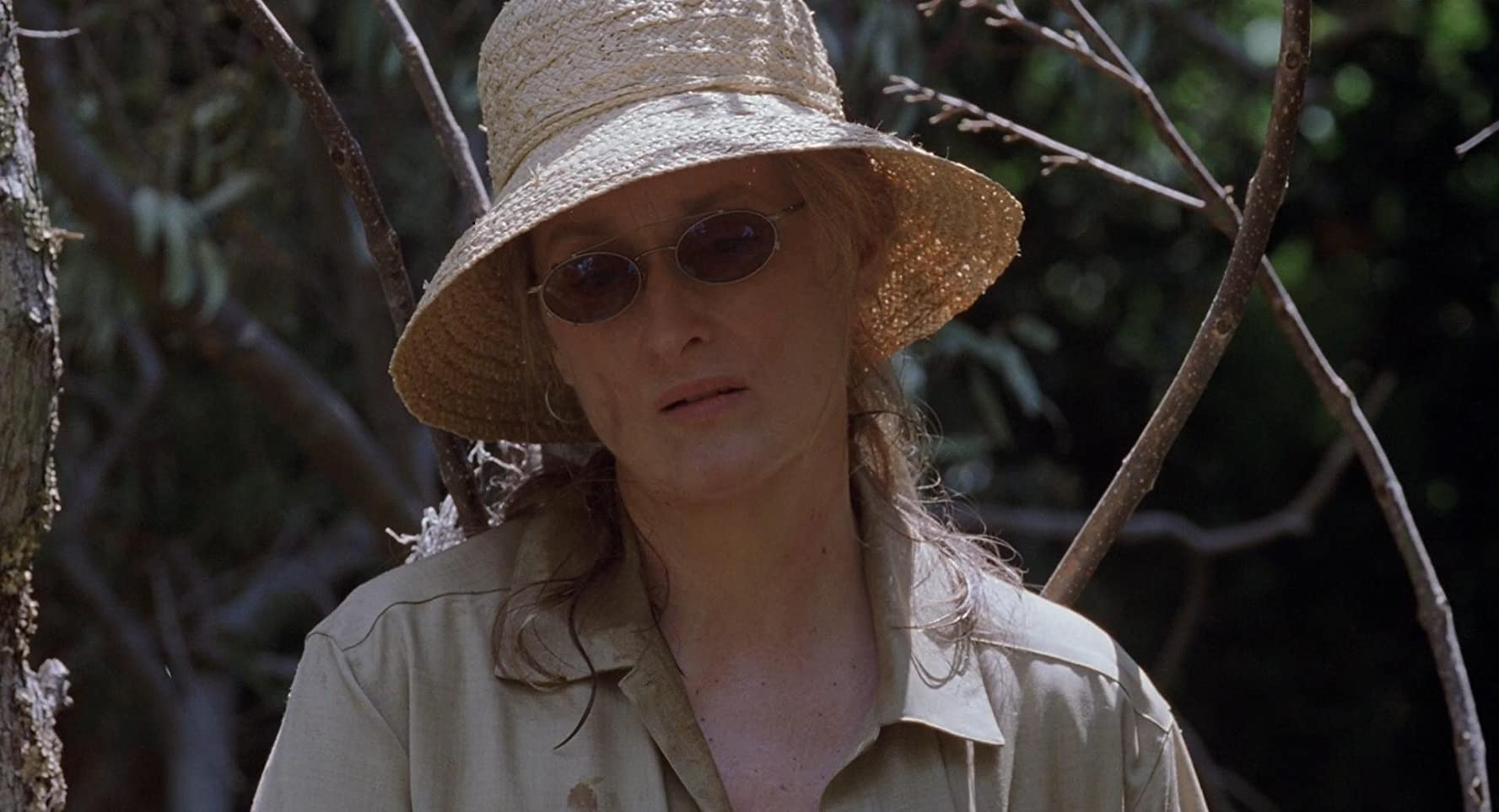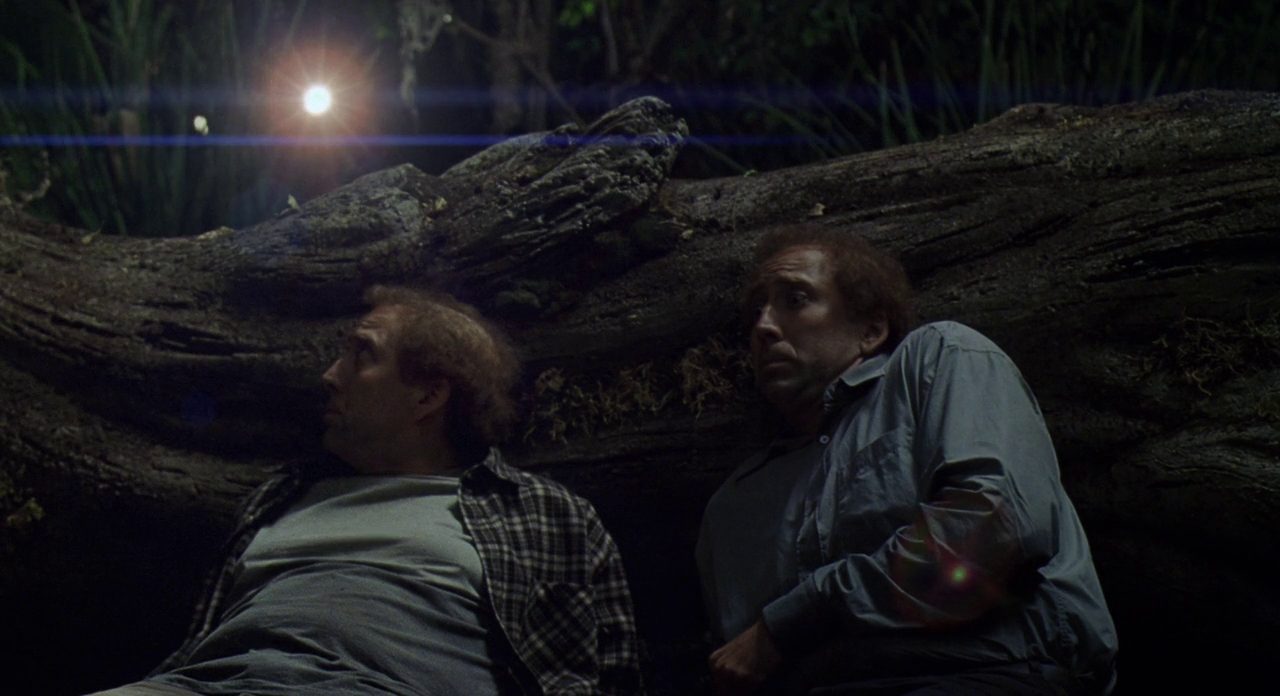

Where to start with this one? Adaptation, a comedy meta-drama from the mind of Charlie Kaufman, directed by Spike Jonze, was released in 2002. I first saw it about a year ago, when it came up as required viewing in one of my classes at UCLA.
First and foremost, I need to get this off my chest. I’m relatively late to the game when it comes to Kaufman’s filmography. I’m not ashamed to admit that. However in my defense, his most celebrated work (in features) was released when I was very young. I had no business with this kind of film when I was 5. I had to discover him on my own time.
About three or four years ago, I saw and enjoyed Eternal Sunshine. It was the first time I had seen it, despite hearing about it for years and seeing posters at Blockbuster Video as a youth. The story, theme and elements felt very unique. It was groundbreaking for me, introducing new ways to tell a story. Seeing Jim Carrey in such a role was also quite eye opening for me… what a legend. But at this time I hadn’t fully immersed myself in the world of film. I didn’t know it quite yet, but Charlie Kaufman’s work would go on to have a profound impact on me…. and now here we are.
The film Adaptation, written by Kaufman, follows the story of himself after writing Being John Malkovich. Kaufman, an exciting “new” writing talent in Hollywood, has been tasked with adapting a book, The Orchid Thief, by Susan Orlean, into a screenplay; A journalistic look at a group of Seminoles lead by a horticulturist named John Laroche. John would poach rare orchids from swamps to sell. Orlean investigated and reported on Laroche and other’s deep passion and interest in flowers for her book.
On the surface it’s a weird idea for a film born out of the struggle of adapting a book for a film. Both on and beneath the surface, the character of Charlie Kaufman is suffering from intense social anxieties, phobias, depression, lack of self-confidence and on top of all of that, writers block. A combination between not wanting to fall back on classic Hollywood storytelling tropes and lack of solid narrative in the source material sets him down a self loathing (and at times hilarious) path to finish the screenplay.
Meanwhile his overweight twin brother, Donald, is starting to think that screenwriting might be his bag too. His rise in the hierarchy of Hollywood by earning quick praise with his very first script causes Charlie to doubt his skills even more. It’s when Charlie decides to write himself into his own adaptation when things start to go off the rails. Ending in a way that I don’t think anyone can see coming if it hasn’t been spoiled for you yet.


I loved this film so much, and I think it’s all rooted in the writing. The story is weirdly complex given its “meta” nature. So much so that I struggle to fully articulate the commentary that Kaufman is making on himself, his own work ethic, and the industry he works in. This is dense material that you can really sink your teeth into. I’m not going to spoon feed it to you. It’s for you to fully decipher.
It’s tough to really nail this film on the head for what it is and what all it’s trying to say. That’s part of the reason why it feels so unique. I really want to do it justice, and explain the concepts well, but I realize that this film is something to be experienced, not read about… maybe after the fact, for further clarification.
It’s a story rooted in realism. Most of the characters are real people. The Orchid Thief is a real book. And the struggle to be original while being aware of your own pitfalls could never be more relevant. However, many fictional elements are involved. Kaufman’s “twin” brother, who is also credited as a co-writer on the film, does not exist in real life. The love between Loroche and Orlean was not a part of the original book. And believe me, the end is not a part of ANY book. These are exciting and interesting elements that came out in Kaufman’s own adaptation.


Roger Ebert once said, “To watch this film is to participate in the struggle of making it”. Kaufman’s perspective is inspiring here.
This film hit home with me in so many ways. By taking a dive into Kaufman’s head, it helped me realize that I’m less alone in the way I think. This film provides a level of encouragement for the common writer to break the status quo, believe in what they’re doing, and never give in to what others expect of them. Not just in the writer’s chair, but in life. Because who knows what could happen tomorrow?
Verdict 4.5 out of 5
Going on to be nominated for several awards across the awards season, Kaufman won a BAFTA award for best-adapted screenplay and Chris Cooper won the best supporting actor Oscar as Laroche. That being said, it’s barely the tip of the iceberg. Nicolas Cage kills it as both Charlie and Donald Kaufman, and the one and only, Meryl Streep does her thing as Susan Orlean.
There are few other films out there that come close to Adaptation‘s level of creativity, transparency and fearlessness. Most being other Charlie Kaufman films. This all ultimately gets me very excited for the upcoming Kaufman film, I’m Thinking of Ending Things, to be released on Netflix this coming September.
“Say who you are, really say it in your life and in your work. Tell someone out there who is lost, someone not yet born, someone who won’t be born for 500 years. Your writing will be a record of your time. It can’t help but be that. But more importantly, if you’re honest about who you are, you’ll help that person be less lonely in their world because that person will recognize him or herself in you and that will give them hope.” -Charlie Kaufman
